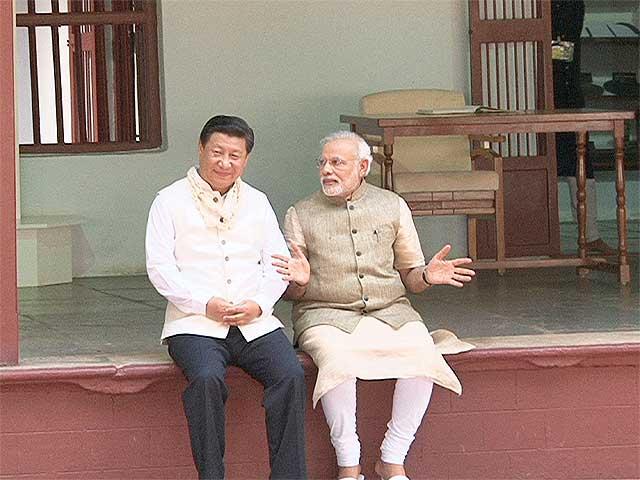Beijing, October 15 (NIA): A day before Chinese President Xi Jinping was to meet Indian Prime Minister Narendra Modi at the BRICS summit in Goa (India) on Saturday, China made it clear that it will not climb down on the issue of India’s admission to the Nuclear Suppliers’ Group (NSG) and India’s bid to have the Jaish-e-Mohammad chief Masood Azhar declared a terrorist by the UN Security Council.
Holding the upper hand on all issues, whether it is the border or trade or terrorism, Xi would expect Modi to climb down a notch or two before he softens on issues which are vital to India. But Modi is not in a position to oblige as he has worked up the expectations of the Indian masses to a high pitch on the Kashmir issue and Pakistani cross border terrorism besides making them believe that India has a right to be a member of the NSG while Pakistan has none of it. A China-India deadlock is thus assured.
“As we speak, various parties are still divided on India’s application to list certain individuals. The technical hold to the listing application gives more time to the (1267 UN) Committee for deliberation and relevant parties for further negotiations,” said Chinese Foreign Ministry spokesperson, Geng Shuang, referring to Beijing’s opposition to Azhar being declared as a terrorist.
“This also shows that China is serious and responsible for this issue,” Geng said at a press conference.
China has twice blocked India’s attempt to get the UN to ban Pakistan-based JeM chief Azhar who is accused of plotting the Pathankot and Uri terror attacks.
On India’s bid to enter NSG, Geng said China stuck to its earlier stance.
“China’s position has not changed regarding the accession to the NSG by India and other non-NPT countries,” he said.
“As for the China-India leaders’ meeting, President Xi Jinping will meet and talk with relevant leaders, including Indian Prime Minister (Narendra) Modi, on the sidelines of the BRICS Summit to be held in Goa, India. Relevant arrangements are still under discussion, and we will release information in due course,” he added.
In June, China blocked India’s entry into the elite grouping, citing the latter’s non-signatory status to the Nuclear Non-Proliferation Treaty.
Commenting on the developments, Sutirtho Patranobis of The Hindustan Times sees a ray of hope.
“For India and China, two “ancient civilizations”, “largest emerging economies” and “most populous nations”, 2016 hasn’t been a great year. Multiples issues have plagued bilateral relations, which are anyway blighted by the long-standing and world’s longest land border dispute,” Patranobis writes.
“The euphoria of hometown diplomacy in Ahmedabad and Xian of 2014 and 2015 now seems a long time ago.”
“If the mostly frozen border problem wasn’t enough, new and not-so-new issues have cropped up: China twice blocked a UN Security Council ban on Jaish-e-Mohammed chief Masood Azhar, seemingly galvanized support against India’s application to enter the Nuclear Suppliers Group (NSG), is blatantly going ahead with the China-Pakistan Economic Corridor (CPEC) that passes through Pakistan-occupied Kashmir and is apparently doing little to reduce the trade deficit of around $52 billion.”
“None of these issues – especially the CPEC which India sees as a strategic thorn – will be resolved anytime soon; definitely not over this weekend in balmy Goa.”

“These are complicated issues whose time for resolution hasn’t come. China’s foreign ministry said as much on Friday that the twin issues of Azhar and the NSG will take time to resolve.”
“The testy bilateral situation changed just a bit on the margins of the G20 summit in Hangzhou last month, when Prime Minister Narendra Modi and President Xi Jinping met on the busy sidelines of the G20 Summit – and the aim in Goa will be take that momentum forward.”
“The Hangzhou meeting was what diplomats privately called a “clear the air” meeting. The thrust of that Modi-Xi meeting was to stem the slide in relations and voice the broad issues. In Goa, it will be about taking steps to move the relationship forward.”
“If nothing else, the Hangzhou meeting decided it was time to hold the first Sino-India counter-terrorism dialogue. Within three weeks of the decision, on September 27, Joint Intelligence Committee chairman RN Ravi led a small team to Beijing, where he held talks with Meng Jianzhu, head of the Commission for Political and Legal Affairs of the Communist Party of China’s Central Committee.”
“The timing of the meeting was important – Kashmir was on the boil, the attack on the Indian Army base in Uri had taken place nine days ago and, unknown to most at that time, India was preparing for surgical strikes on terror bases in Pakistan Occupied Kashmir (PoK).”
“Officials privately said there was a “message” in the timing of the dialogue as Beijing was closely watching developments in the northwestern part of its borders.”
“The meeting in Goa between Modi and Xi will also focus on building on what started in Hangzhou.
It will also be important to see in the next few months whether any senior military or internal security official from China visits India. Though there is unlikely to be any announcement about such visits in Goa, but if such a trip – say by a PLA general – does take place, it will carry on the momentum of high-level exchanges between the two countries.”
END





























































